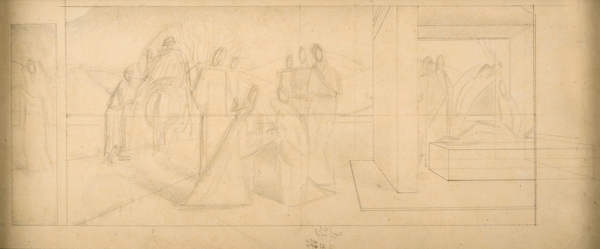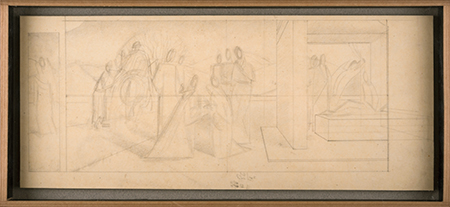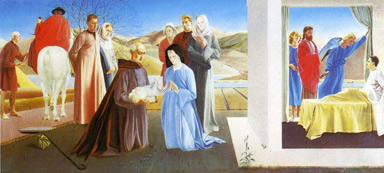

 Hover over the painting to magnify (there may be an initial delay while the magnified image is loaded)
Hover over the painting to magnify (there may be an initial delay while the magnified image is loaded)Winifred Knights (1899-1947):
Study for St Martin's Altarpiece, Canterbury Cathedral, circa 1932
Framed (ref: 7582)
Squared, inscribed with notes
Pencil on tracing paper
5 1/2 x 13 3/8 in. (14 x 34 cm)
See all works by Winifred Knights pencil allegory religion
Provenance: The Artist's Family

Literature: Winifred Knights, exh. cat.,The Fine Art Society, London, 1995, pp. 56–7 (similar work repr. p. 43)
In 1928, Knights received a prestigious commission to paint a reredos for the Milner Memorial Chapel in Canterbury Cathedral, which the architect Sir Herbert Baker was designing. The painting took several years to complete, and it was difficult for Knights to maintain the clarity of her original conception, presented in numerous preparatory studies, while respecting the preconceptions of the architect.
Taking inspiration from Sulpicius Severus’ fourth-century Vita Martini, Knights records three scenes from the life of St. Martin of Tours: St Martin gives half his cloak to a beggar; St Martin restores a child to life; St. Martin’s vision of Christ.
The central scene, St. Martin restores a child to life, clearly held a deep significance for Knights, who had recently given birth to a stillborn son. Knights includes herself among the onlookers as well as members of her family, including her mother Mabel and Thomas Monnington; her sister Eileen and nephew Martin provided the model for the mother and child. It is likely that the elder St. Martin, wearing a bishop’s cloak, is a portrait of the architect Sir Herbert Baker.
Bishop Bell, who was involved with commissions for religious works from numerous artists including Vanessa Bell, Duncan Grant, Augustus Lunn and Hans Feibusch, described the St Martin Altarpiece as ‘one of the most lovely, delicate and deeply felt modern religious paintings that I know’ (G.K.A. Bell,‘The Church and the Artist’, The Studio, September 1942, vol. 124, no. 594, p. 81).

 Unsung Heroines
Unsung Heroines SOLD
SOLD




